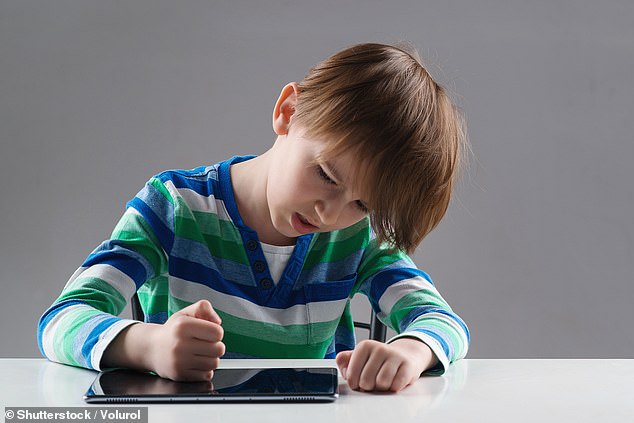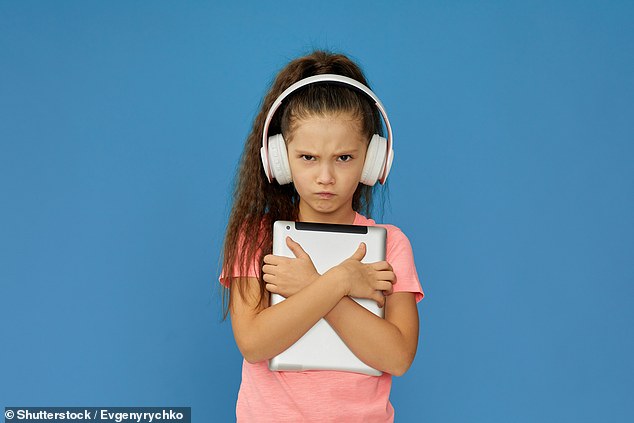- Children who use tablets an extra hour a day are more likely to be angry a year later
- Tablet use can “contribute to a cycle that is detrimental to emotional regulation”
Children who use their tablets an extra hour a day are more likely to be angry or frustrated a year later, a study suggests.
Most parents will, at some point, have given their children a tablet to keep them busy or distract them from a tantrum.
But experts warn that this could lead to problems down the road.
A team from the University of Sherbrooke in Quebec asked 315 parents in Canada to record their children’s tablet use at ages 3.5, 4.5 and 5.5 years.
Parents were also asked to report their children’s expressions of anger and frustration at these ages.
A study suggests that children who use their tablets for an extra hour a day are more likely to be angry or frustrated a year later (file image)
Overall, children in the sample spent an average of 6.5 hours per week (almost an hour a day) using tablets by age 3.5 years.
However, this represented a large variation between individual children: some spent no time using tablets per day, while others spent more than five hours per day using them.
The analysis found that at age 3.5, each increase in tablet use of one hour and 15 minutes per day was linked to a 22 percent increase in anger or frustration at age 4.5.
This could include situations such as a child getting angry when he or she has to go to bed or having a tantrum when he or she doesn’t get what he or she wants.

Researchers warn that tablet use in early childhood may “contribute to a cycle detrimental to emotional regulation” (file image)
In turn, children who were more angry or frustrated at age 4.5 were more likely to spend more time with tablets at age 5.5.
In a paper published in the journal Jama Pediatrics, researchers warned that tablet use in early childhood may “contribute to a cycle that is detrimental to emotional regulation.”
“At 3 years old, children are able to handle mobile devices on their own,” they said.
‘In fact, parents reported frequently using screens to keep children busy while completing important tasks and chores.
‘This suggests that tablet use may often be a solitary activity for children and therefore may provide few opportunities to learn and practice emotional regulation strategies.
‘Furthermore, recent work has provided evidence that children’s use of electronic media contributes to reduced communication between parents and children, an important mechanism for children to learn self-regulation.’
Professor Caroline Fitzpatrick, one of the study’s authors, said: ‘Caregivers also report using tablets to calm children when they are experiencing strong emotions.
‘This strategy is likely to backfire in the long run, as it can interfere with children’s ability to develop internal strategies to manage their emotions.
‘Parents of preschoolers should closely supervise and limit their children’s tablet use. Parents can also involve their children in activities that help them develop emotional regulation skills, such as shared book reading and imaginary play.’
However, commenting on the study, Professor Chris Ferguson, from Stetson University in Florida, said the findings “do not suggest an association that should cause parents to be overly concerned about tablet use”.

